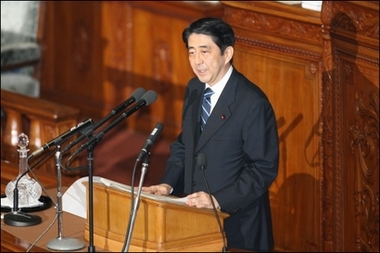Japan PM vows 'new national identity'
(AFP)Updated: 2007-01-26 15:02
TOKYO - Japan's Prime Minister Shinzo Abe has once again vowed to shake off the legacy of World War II defeat to create a "new national identity" as he is trying to revive sagging public support.
The conservative premier outlined his policy proposals in an address to a new session of parliament as he faces growing questions over his leadership.
"It's time to embark on a bold review of the postwar regime," said Abe, Japan's first premier born after the war.
"It is my mission to draw up a new national identity that can survive severe storms over the next 50 or 100 years," he said.
He pledged to pass a bill on a national referendum - the first step in revising the constitution - during the parliament session, which will end in June.
He also said that reforming the education system was the cabinet's top priority.
"Haven't we ignored such values as self-reliance, public responsibility, morality and love of the country? For the future of Japan, it is extremely important to teach children about these values."
Abe, who took over in September, has already pushed through conservative reforms including creating a full-fledged defense ministry for the first time since World War II.
But a poll this week put his approval rating below 40 percent, compared with 70 percent after he took over from the popular Junichiro Koizumi.
Abe has faced the resignation of two top aides and welcomed back into the fold opponents of Koizumi's reform agenda, leading to accusations that the 52-year-old premier is under the thumb of older powerbrokers.
Abe pointed in his speech to his success in improving ties with China and South Korea, which refused to talk to Koizumi due to his annual visits to a controversial Tokyo war shrine.
Despite his reputation as a hardliner, Abe visited Beijing and Seoul immediately after taking office. Beijing announced Thursday that Premier Wen Jiabao would pay a return visit to Tokyo in April, the first trip here by a Chinese leader since 2000.
"We have improved relations by holding heart-to-heart talks with the leaders of the two countries," Abe said.
"We will forge strategic reciprocal relations with China for the benefit of the two countries," he said. "We will also build close, forward-looking ties with South Korea."
But Abe, who built his career talking tough on North Korea, renewed his criticism of Pyongyang, which tested its first atom bomb days into his premiership.
"Our country will never tolerate North Korea's nuclear weapons development," Abe said.
|
||
|
||
|
|

